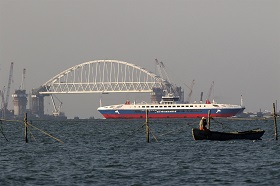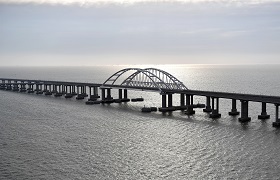The partnership between the United States and the Russian Federation is fairly balanced. There is a competitive mixture of agreements and disagreements. In today’s geopolitical climate, tensions can escalate quickly. All it takes is disinformation or a lack of context to irritate international relations. There is more than enough blame to go around for the state of current affairs. That being said, the media is particularly responsible for where we are at. Their profound ability to frame and string together events in order to fit their narrative is remarkably effective. All media is narrative. There is always a good guy and a bad guy; to validate your hero, you have to create a villain. In American corporate media, no one has been cast the villain more than Russia. If there is any unforeseen outcome or possible misconduct within the political sphere, like clockwork, there will be attempts to connect Russia with the crime. It is a constant burden, and simply, not beneficial for diplomatic relations.
The overall problem hindering relations is the false narrative. It is the foundation of U.S. foreign policy thought and decision-making. The fact of the matter is, you can make an infinite amount of great choices, but if they are all based on the wrong assumption, you will inevitably be led in the wrong direction. Unfortunately, both Americans and Russians have been led into a new era of McCarthyism. Career foreign policy officials would rather allow mutual conflicts to fester instead of solving them in a diplomatic fashion. This can be seen across the board but is especially true in regard to Russia.
The U.S. and Russia are continually at odds with each other for different reasons. One of those reasons is the information culture that we Americans are inculcated in. An anti-Russia narrative is pervaded into almost all the information we consume about Russia and it's propped up by the American political establishment, national security and foreign policy “experts,” and the mainstream media--all of which display a blatant intolerance towards views that diverge from their presupposed antagonism towards Russia.
How did the U.S. respond to the people of Crimea exercising their democratic right to self-determination? They responded by imposing economic sanctions on the Crimean Peninsula. A punishment that seems completely antithetical to American values. What kind of message does that send to the international community? All too often, sanctions are used as a retaliatory action against those in power, but instead, they specifically impact ordinary citizens and small businesses. In the case of the Crimean sanctions, those who are hurt the most are ordinary people, similar to ordinary Americans. They are people who work hard, love their families, and pursue their dreams just like Americans. Their crime? They voted to reunite with Russia.
The will of the Crimean people is clear. Those nations, who value democracy, should stand up and support the people of Crimea. The U.S. needs to be at the forefront of this movement. As a country that sincerely believes in democracy and the right to self-determination, America's policies should match America's values. Recognizing Crimea’s reunification with Russia would be the logical merger of those two. Moreover, the U.S. would be creating leverage for itself by putting its best foot forward and seeing to it that Russia also helps deescalate tensions in eastern Ukraine. A diplomatic resolution can only be reached if all parties are willing to come together and compromise.
The partnership between the United States and the Russian Federation is fairly balanced. There is a competitive mixture of agreements and disagreements. In today’s geopolitical climate, tensions can escalate quickly. All it takes is disinformation or a lack of context to irritate international relations. There is more than enough blame to go around for the state of current affairs. That being said, the media is particularly responsible for where we are at. Their profound ability to frame and string together events in order to fit their narrative is remarkably effective. All media is narrative. There is always a good guy and a bad guy; to validate your hero, you have to create a villain. In American corporate media, no one has been cast the villain more than Russia. If there is any unforeseen outcome or possible misconduct within the political sphere, like clockwork, there will be attempts to connect Russia with the crime. It is a constant burden, and simply, not beneficial for diplomatic relations.
The overall problem hindering relations is the false narrative. It is the foundation of U.S. foreign policy thought and decision-making. The fact of the matter is, you can make an infinite amount of great choices, but if they are all based on the wrong assumption, you will inevitably be led in the wrong direction. Unfortunately, both Americans and Russians have been led into a new era of McCarthyism. Career foreign policy officials would rather allow mutual conflicts to fester instead of solving them in a diplomatic fashion. This can be seen across the board but is especially true in regard to Russia.
The U.S. and Russia are continually at odds with each other for different reasons. One of those reasons is the information culture that we Americans are inculcated in. An anti-Russia narrative is pervaded into almost all the information we consume about Russia and it's propped up by the American political establishment, national security and foreign policy “experts,” and the mainstream media--all of which display a blatant intolerance towards views that diverge from their presupposed antagonism towards Russia.
Historically, anti-Russianism stemmed from opposing ideologies that were irreconcilable due to the nature of their goals. This history, although relevant, overrides present-day facts, which show that both nations have a shared and vested interest in promoting democratic values, world peace, and economic prosperity. Despite the countless anti-Russia smears, the U.S. and Russia are primed and ready more than ever before to cooperate on the world stage. The two nations, given their status as global leaders, have the potential to solve some of the world's biggest problems and act as a robust force for good--but it starts with working together and abandoning these false narratives that presuppose Russia is inherently evil, autocratic, and not to be trusted.
President Trump has repeatedly gone against the grain in order to shake things up and reverse the status quo. For instance, Trump has been an outspoken critic of NATO, and the financial burden the U.S. has carried over the years. Similar to other situations during his presidency, Trump could be doing more to further his agenda. NATO was primarily created to counter the Soviet Union, which disintegrated in 1991. The so-called “experts” would rather promote a new cold war than pursue diplomacy, something that is neither wise nor in the best interest of the United States. This is why the U.S. needs to clean the house and reinvent its approach to Russia, among other nations. American foreign policy should be based on reality, not ill-conceived narratives, if it wants to be able to create viable solutions for the many challenges it faces today and in the future.
How can the American and Russian partnership be strengthened? What can be done to ignite the diplomatic process? What can be the catalyst of this new foreign policy initiative?
Changing the course of action and recognizing Crimea’s reunification with Russia would be controversial, and it would send a shockwave through the international community. Yet, a decision of this magnitude would be the perfect step in strengthening the American and Russian partnership.
The issue of Crimea has been pushed aside by those in the corporate media, as they have moved on to other baseless anti-Russia talking points. If you look closely, Crimea was the beginning of America’s newfound anti-Russia narrative. Crimea is the original Russia-gate. Before there was collusion, there was Crimea. And, what happened with Trump—Russia collusion? Absolutely nothing. What about the Mueller investigation in general? Well, the DOJ was unable to prosecute any act of Russian interference. According to the media, Russia fiercely annexed Crimea in an outright attack on national sovereignty and democracy. In reality, Russia was protecting democracy. Additionally, they were protecting ethnic Russians from conflicts that were starting to boil over in Ukraine. Significantly, the people of Crimea are 67% ethnically Russian and 85% primarily speak Russian. Ukraine is more complicated and dynamic than the media wants you to think, and there are many facts to be considered.
When the media talks about Crimea, they conveniently leave out pertinent facts. Acknowledging such facts would vitiate their narrative. For example, the United Nations Development Programme (UNDP) found in several polls that the majority of Crimeans were in favor of Russian reunification between 2009 and 2011. In 2014, after the removal of former Ukrainian President Viktor Yanukovych, whom more than 80% of Crimeans voted for, Crimea held a referendum to rejoin the Russian Federation. The results showed that almost 96% were in favor of reunification. Subsequent polls show that: 82% of Crimeans believe “the referendum reflects most Crimeans’ views,” 91% believed the referendum was free and fair, and 88% believed that the referendum should be recognized.
How did the U.S. respond to the people of Crimea exercising their democratic right to self-determination? They responded by imposing economic sanctions on the Crimean Peninsula. A punishment that seems completely antithetical to American values. What kind of message does that send to the international community? All too often, sanctions are used as a retaliatory action against those in power, but instead, they specifically impact ordinary citizens and small businesses. In the case of the Crimean sanctions, those who are hurt the most are ordinary people, similar to ordinary Americans. They are people who work hard, love their families, and pursue their dreams just like Americans. Their crime? They voted to reunite with Russia.
The will of the Crimean people is clear. Those nations, who value democracy, should stand up and support the people of Crimea. The U.S. needs to be at the forefront of this movement. As a country that sincerely believes in democracy and the right to self-determination, America's policies should match America's values. Recognizing Crimea’s reunification with Russia would be the logical merger of those two. Moreover, the U.S. would be creating leverage for itself by putting its best foot forward and seeing to it that Russia also helps deescalate tensions in eastern Ukraine. A diplomatic resolution can only be reached if all parties are willing to come together and compromise.







